While I was staying at the no-star Hotel
Minimum in Kyiv, I regularly dined at the friendly Café Chicot,
around the corner. On my last night in town, a friend of the
owner was curious about my work in the country. He asked, "What
are you doing in Ukraine?" Since I was doing more than one
thing, my explanation was a bit slow to get off the ground. He
interrupted, asking, "Are you a volunteer?" I said yes. Once
that was clarified, the man paid for my dinner.
Volunteerism in the service of a society
in distress can take many forms. A broad outline would include
everything from helping to rebuild bombed houses, to preparing
food for the front, all the way to fighting at the front. I
would even include some aspects of the work of non-governmental
organizations. All of these things require a commitment; this is
implicit if one is going to experience discomfort in an
unfamiliar land at war.
There are people and organizations that
help more, and others that help less, or not at all. I witnessed
this for some decades in the aftermath of the Bosnian war,
observing everything from sincere, unregistered grassroots
groups to "phantom" NGOs that only existed to receive
international donations, and then vanish.
From the look of it, volunteerism in the
face of war is in a rudimentary stage in Ukraine, with
many—probably countless—local organizations going it on their
own. A few international NGOs and, of course, intergovernmental
organizations (such as UN agencies) are on the scene, but not to
anywhere near the extent I witnessed them in the immediate
aftermath of the Bosnian war. Then, you could see the white NGO
jeeps nearly everywhere.
On the other hand, individual
international volunteers began arriving to Ukraine soon after
the beginning of the full-scale Russian invasion in February of
2022. They arrive with varying goals, but again, they come with
commitment. There are domestic grassroots organizations with
different degrees of cohesion, to some extent ready to receive
the internationals. While the main goal of my four-week visit
last October was research, I spent about a week's time
volunteering with several organizations. It was a way to witness
and to express solidarity.
Ants and bombs
In Kyiv, I spent a day in an outer
neighborhood on the left bank of the Dnipro, chopping apples
with 20-odd middle-aged women. Murashky ("Little Ants")
is a private organization that prepares food packages for troops
on the front line. Maksym, dressed in a military uniform, met me
at the intersection of Ronald Reagan Street and Honore de Balzac
Boulevard and guided me upstairs. There, I found a
well-equipped kitchen with large work tables, drying ovens,
stoves, and bags of donated food ready to be processed.
Women were involved in several tasks.
Some were mixing ingredients to make dried soup mix, to be sent
to the front in individual packages. Others were making ginger
cookies, and many women were preparing apple pieces to be dried.
I started out making slabs of cookie dough to be cut and shaped
but was soon transferred to the apple section. There, I chopped
and cored apples for the rest of the day.
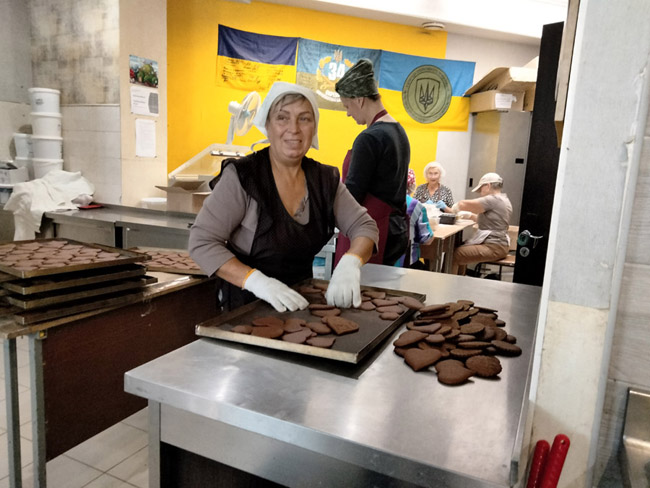
Preparing cookies for the front
Mariya was directing the work, with help
from Kalyna. Mariya told me she was from Donbas, and Kalyna was
from Luhansk. All the women spoke Ukrainian or Russian, neither
of which I
know. To my luck, Lenka spoke Italian, having lived in
Italy for 15 years. We managed to chat away in a mixture of
Italian, Spanish, "Ukrainianized" Bosnian, and a wee bit of
English. Lenka told me that it meant a lot that I came there
from so far away. I said, "Thank you, but I can only help a
small amount." She said, "We each do a little, and together it
matters a lot."
Lenka told me that she had lived in
Naples. I asked if she had a husband: "Morto." Children? No, "Io
sono sola." In 1990, she had traveled with her husband to
California to visit relatives. She remembered a lot of swimming
pools. She told me that from the airplane, she saw a house, then
a swimming pool, then a house, then another swimming pool, and
so on. She asked me if I had a swimming pool, and was shocked
when I said no.
Lenka lamented the "catastrophe" of the
war, as she called it, saying that she couldn't understand the
minds of the people who came to Ukraine to do such crimes. She
told me she hated the Russians. She remembered 9/11, and asked
me where Bin Ladin was killed. I said "Pakistan." She asked me
if the Mossad killed him. I said, "No, the Americans did." She
asked, "Can't they kill Putin?" I said it was complicated. Lenka
told me that the Russians should be killed; first Putin, then
all the rest of them. I did not muster the words to argue.
Maksym told me that Murashky was founded
shortly after the war began. Volunteers were working in a school
kitchen, and then they moved to the present space. They've had
to build up their equipment stock, and they're always short of
money. They could use more volunteers as well. If you are
interested in helping out, look at their Facebook page
here; a lot of content is translated into English. And if
you'd like to make a donation, Murashky's PayPal address is
here.
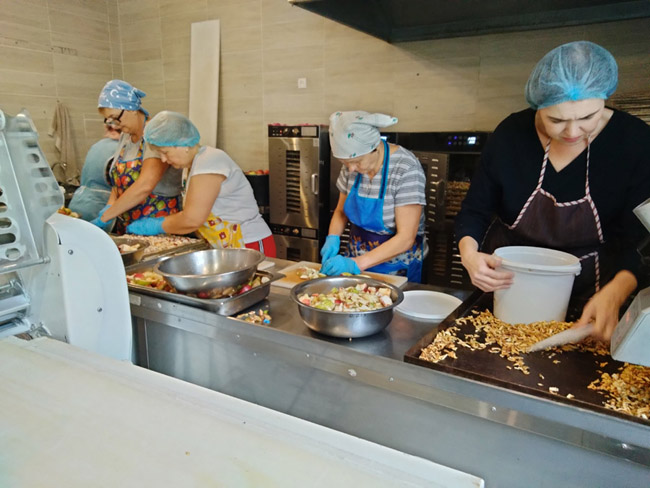
Women of Murashky processing
apples
Another day, I found my way to the town
of Hostomel to help local and international volunteers remove
rubble and earth around the foundation of a bombed house, as I
mentioned in my previous journal. This weekend activity was
organized by the loosely coordinated group "Brave to Rebuild,"
which arranges volunteer actions in several parts of Ukraine.
Volunteers communicate via an internet-based network; much of
the traffic consists of disoriented internationals like myself
asking each other how to join, how to find the required form to
submit personal information, and how to arrive to the next
activity.
Somehow, it works, but it was to some
extent a reflection of the group's level of disorganization that
I received contradictory messages telling me where to show up to
join the group's bus to Hostomel. Those messages included
landmarks that were no longer there and individuals who were no
longer team leaders. Together, all this made finding the group
of volunteers feel like a logistical improbability. But
persistence and a bit of luck helped me succeed.
Among us 15-odd volunteers, there was
one wheelbarrow and eight or nine shovels. We waited for a dump
truck to arrive out front on the street that was formerly known
as "Lenin Street," now changed to the easier "Svyatopokrovs'ka."
As is so often the case, both the old and new street signs were
still in place.
A volunteer from Utah, with an extra
dose of common sense, ran to a hardware store and bought a
half-dozen five-gallon buckets for us to use. As the dump truck
arrived, we set to work moving rubble and excavating the
foundation of Anton's house. Someone admonished us to be careful
where we walked around, since there may be unexploded mines or
bombs in the vicinity. There was a bomb crater in the back yard.
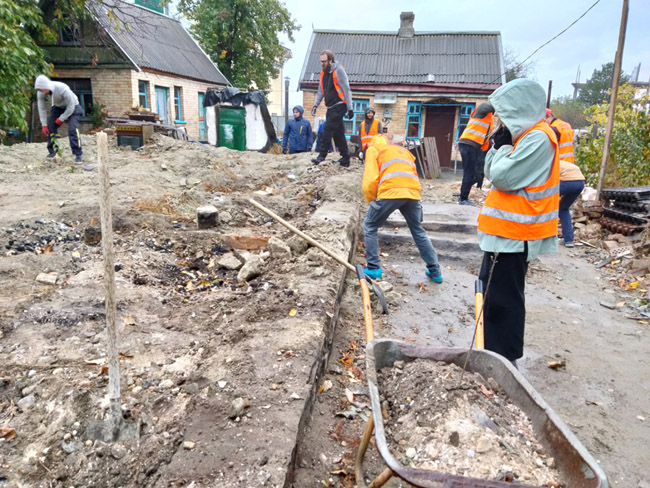
Clearing the rubble at a bombed
house in Hostomel
Before the war, 90% of the residents of
Hostomel were Ukrainian speakers. I was told that alongside the
atrocities that had been committed in nearby Bucha, some 400
people went missing from Hostomel as well. I asked someone what
"missing" meant. They just answered, "mass graves."
I worked with Oleh, a young political
science student at the university in Kyiv. There was Zhenya, a
local English teacher. I met Vovo (short for Volodymyr), from
the same region where my grandmother was born. Many of the
Ukrainians were IT students or practitioners. One was from
Luhansk, now occupied by the Russians. He's been in Kyiv for
nine years. His grandmother and step-sister are stranded in
Luhansk. He can talk to them on the phone, but they can't really
say anything.
One of the internationals had just come
from Odessa, a lovely city on the Black Sea. The Russians had
been attacking the city for months. This man said that the city
is "okay"; you hear an air-raid siren every couple of days, but
the attacks are mostly on the grain silos and the port, not
right in town.
Among the internationals, there was a
Brazilian woman who has been living in the US. There was Marti,
from Finland. He's a lawyer and can earn money by advising
younger lawyers remotely. He said he would like to stay in
Ukraine, but he has to see how cold the winter is. I said,
"Finland has cold winters." He responded that he hasn't been
there in the winter lately, and last winter he was in western
Europe.
There was Elias, an engineer from
Sweden. He wants to stay in Ukraine too. Elias explained to me
the difference between missiles and rockets, and their impact. I
asked him how he knew all these things, and he said he had been
in the Swedish military for 10 years, with the job of analyzing
Russian munitions.
We filled up the dump truck, and someone
brought several pizzas in boxes to share. By 4:00 p.m., our work
was finished. I hoped we had made a dent in the project. Some of
us were commenting how a jackhammer and a grader or Bobcat could
have taken care of the job in a few hours. But those resources
are in short supply. In any case, solidarity was built, and it
was good.
That evening, the internationals put
together a plan to go out to dinner, to a place called "Squat
17B," after the address, on an alley named "Skvot" across the
street from Shevchenko Park. There was a pleasant atmosphere,
with visitors from other work projects, including three Germans,
two French Canadians, two Swedes, one Parisian, and more. Marti
from Finland and Elias from Sweden were chatting in Swedish, and
they explained to me that it's common for Finns to learn Swedish
as a second language.
I tried to get up and leave at about
9:00, but the Brazilian woman admonished me, "NO. You are
staying with us. I have a van coming to take us to the next
place soon." So I stayed, and when the van came, I sneaked away
and went back home. The scene of internationals enjoying
themselves abroad reminded me of what I saw 20 years ago in
Nablus during the second Intifada where, just as now in Ukraine,
young internationals were finding ways to combine solidarity
action with their natural urge to relax.
* * *
I met with Willie before the Hostomel
activity, and again afterwards. I had connected with him on line
via the Brave to Rebuild network. He came from the Midwest,
hoping to stay in Ukraine for a long time. He showed me a couple
of tattoos on his wrist. One was the Ukrainian flag. I said,
“That’s a commitment.” Willie said that he felt committed to the
Ukrainian cause. He had donated some money but didn’t feel like
that was enough. So he came to Kyiv to find ways to contribute.
He was now working on getting a long-term residency visa, as the
tourist visa only lasts 90 days.
On the subject of security, Willie said
that no one pays any attention to the air-raid sirens in Kyiv.
He noted that the neighborhood west of the Maidan was the safest
place in the city, because that's where the presidential
compound is. Therefore, the security is good there, as the army
shoots down any drone bombers that may come around. You're safe
from the bombers, he said, but the falling debris can be
dangerous.
When I met with Willie after the
Hostomel activity, he told me that he had worked at the same
location on a subsequent weekend. As it happened, his group
finished what had looked like the endless task of excavating
Anton's foundation. Later, Willie went to work in Kherson with a
Brave to Rebuild group; he told me that “the Russians are right
across the river and there’s some bombing.” He went to help
shovel mud, as there were mountains of it from the flood, after
the Kakhovka dam was bombed during the summer.
A conversation with Scott
I had the chance to talk with Scott, who
is starting a local service NGO. I met him via his helpful
presence in volunteer communications. Scott's involvement with
that sphere had grown because he had been in Ukraine longer than
the average volunteer, and he saw a certain amount of chaos in
group operations. He had a few criticisms to share with me on
that score.
For example, Scott wondered why Dobrobat,
a prominent and relatively well-organized volunteer network, was
sending internationals to Kherson, "to move mud under fire," as
he put it. He also wished that volunteers would plan to stay in
country for longer than a week, so that they could make a solid
contribution to whatever effort they were involved in. "There
are substantive things you can do," he said. "If you're willing
to go to Chernihiv, there is a very active organization:
Phoenix, and they have full-time construction work."
Scott also expressed exasperation at
prospective volunteers who wrote asking, "Do I need to buy body
armor to go to Kyiv?" He said, "If you're thinking about body
armor, you won't need it in Kyiv. And if you're going to the
front, you're talking to the wrong group." Scott mentioned
people he knew who had gone to the extreme margin of
volunteerism, joining the group of international volunteers
called the International Legion for the Defense of Ukraine or,
more simply, the Legion. One of them was working on de-mining,
and another had been injured in combat, and was now working in
delivery.
Scott spoke of a garage where mechanics
from abroad were fixing the vehicles of international
volunteers, and there are many small, independent delivery
organizations bringing useful materials into the country. Most
of the domestic volunteer groups he was familiar with are "ad
hoc," not registered. Scott mentioned seeing Red Cross vehicles
in Kyiv, but their staff are allowed to move around only within
a small radius, because of the organization's policy on
liability considerations.
There is a telephone application,
covering all of Ukraine, that announces whenever there is an
air-raid alert. You can set it to provide alerts pertaining to
whichever region you are in. It will sound off whenever there is
a perceived danger. And you can check to see how many alerts
there have been on a given day. I found it not so useful, other
than for its nuisance value. The best tactic is to watch what
other people are doing when there's an alarm. And I had been
told that if you're in Kharkiv, near the border with Russia, and
there is truly a missile coming in, it will be fired from so
close that you won't really have time to escape.
Scott declared that "without Google
translator and Google maps, we would not be able to do
anything." Many shopkeepers pull out their phones when they need
to communicate with a foreigner. I asked Scott why, when I was
looking for a spot that is less than a kilometer away, the
Google map application told me that I was 20 kilometers away. He
said that it has to do with the air-raid alarm system; that the
mechanism "spoofs" the GPS to throw off the Russians. He said
that then, it happens that "you can't get there from here."
As we were winding up our conversation,
I said to Scott that I didn't really see the war finishing very
soon. He answered, "I'll be here however long it is."
Chernihiv: success in spite of
logistics
Having gotten
in touch with the people at Charity Fund Phoenix-UA,
I decided to take a few days off to go do some work in Chernihiv.
I hoped that I would be able to do something more skilled than
wielding a shovel.
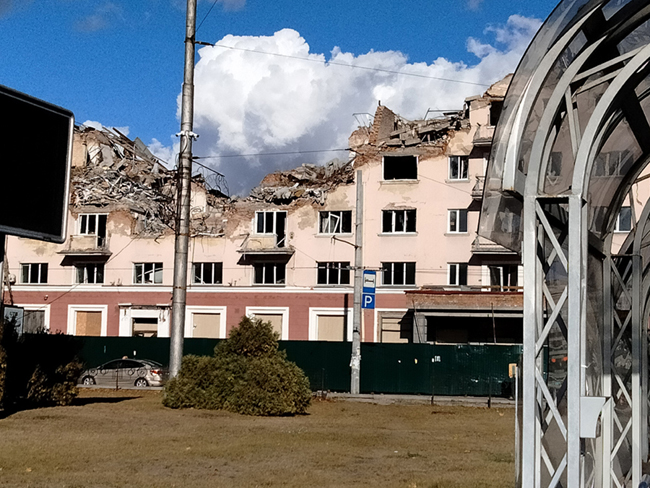
Remains
of the Hotel Ukraine, Chernihiv
The first
thing I saw when I got off the bus from Kyiv was a large
five-story building with a massive crater-like shape taken out
of it. Somebody really wanted to do damage to that building.
This turned out to be the Hotel Ukraine, where I was supposed to
meet the people from Phoenix. I called their number and reached
Richard, a volunteer from the US. He said, "Wait there, you'll
hear our van approaching."
Sure enough,
I heard the white van from a block away, sounding like a metal
dumpster being dragged across concrete. Richard and the driver
picked me up and brought me to meet the Phoenix crew: the
foreman Valerii Rubkov (who is the founder of the organization),
and the brothers Ruslan and Dima. Dima said to me in unaccented
English, "I speak English very well," and that was the last
English I heard from him during the rest of my stay.
We got to
work soon; after a bit of lunch we drove to a partially rebuilt
house where there was a pile of lumber in the back yard. We
sorted out the lumber, bringing long boards and beams into the
house. The pile of warped or cracked lumber left outside was as
big as the amount we carried in.
Richard
explained to me that the house had been severely damaged
when a Russian plane was shot down and crashed into it. The
couple who owned the house sought refuge abroad, but the wife, Yulia, returned to do aid work and to see that her house was
restored. By the time of my visit, the house was a shell with
all the rafters replaced on one side, waiting for the other half
of the roof to be reframed. The house next door had survived the
plane crash, but it had caught on fire and was quite damaged.
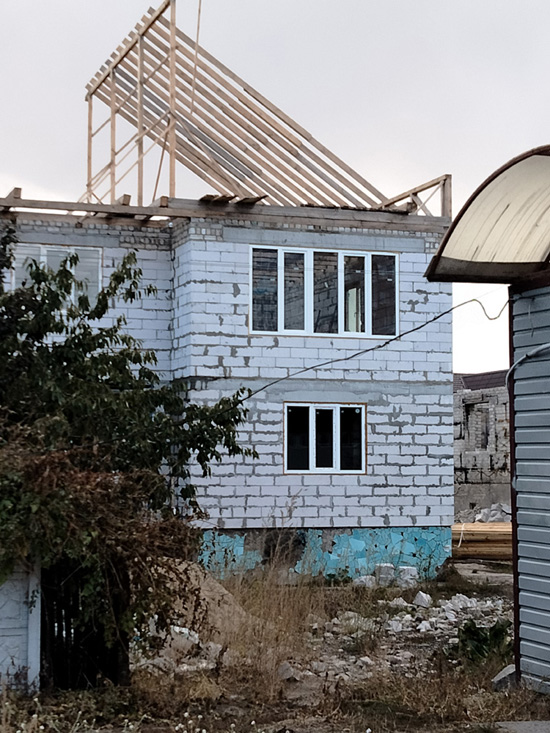
Yulia's partially rebuilt house
The contemporary style of house
construction that I observed in Ukraine was very close to what I
have seen in Bosnia-Herzegovina, where all of the walls are
built from concrete cinderblocks or other masonry, and the only
wooden component of framing is the roof rafters. The manner of
destruction of such a house is the same as well: a bomb hits the
roof; the rafters and then the rest of the interior burns; only
the masonry hull is left, unless parts of it are hit by bombs as
well.
Phoenix had rebuilt Yulia's house from
the first floor up. The walls of the first floor were built, and
then a crane set in place massive concrete slabs to create the
second floor. The walls of that floor were in place as well, and
we carried up a dozen rafters boards—full 2"x 6" (5cm x 10cm)
and laid them on the top floor.
As we moved
boards and beams into Yulia's house, Richard described to me
some of the obstacles to doing humanitarian work in Ukraine.
There are problems with money transfers and importation of
goods; the government taxes donated construction materials. As
in Bosnia, there are layers of leftover regulations and
bureaucratic habits that may well go back to Byzantine times.
Richard told me about a foreigner who wished to donate a
much-needed brick-making machine, but red tape simply prevented
him from doing so. Richard asked, "It's hard to be good.
Why is it so hard to give?"
The next day I worked with the team on
another house, one belonging to Iryna and her family. The house
had been bombed with an artillery missile at the beginning of
the war, and it was all but devastated. Phoenix decided to
salvage it, even re-pouring the basement slab and part of the
footings. I teamed up with Dima, and we spent the day cutting
and installing 1"x4" sub-paneling for the inside of the exterior
walls, which would later be covered with sheetrock.
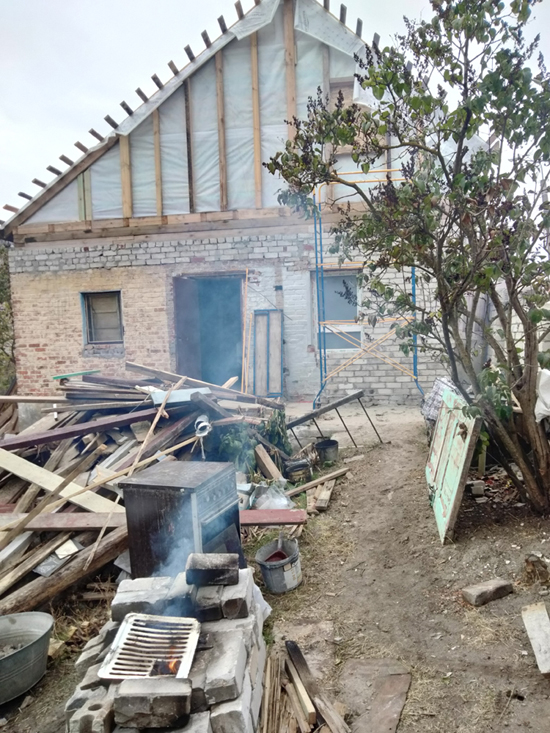
Iryna's house under restoration
The team has two mascot dogs, Rusty and
Jessica, that attend all the projects. They keep busy at all
times. You have the impression that they are trying to make
themselves useful, whether they understand what is going on or
not. I mentioned this to Richard, and he said, "Yes, they are
like us."
As for the team of Valerii, Ruslan, and
Dima, theirs was a very competent operation. You could see that
they had much building experience and high standards, and they
worked smoothly without the need of much talk. Ruslan has
architectural training, and the crew has all the necessary,
modern tools.
In the middle of the day, Iryna came
over with a voluminous lunch: mashed potatoes, fish, meat, and
some rare vegetables. She helped with various tasks on the house
for the rest of the day. Valerii put her to work with a power
planer, smoothing out some posts that were already in place.
It was a long day; after we left Iryna's
house we drove the noisy van out into the countryside to pick up
some corrugated ferro-cement roofing. Since we were heading
north, toward the border with Belarus, we encountered a
checkpoint. We had our identification documents ready to show,
but the guards did not bother looking at them. I suspected that,
with the old van and the crew of workers, they figured we could
not possibly be involved in anything that was a threat to the
State.
The local Caritas headquarters, located
in a residential part of Chernihiv, was sharing rudimentary
living quarters with Phoenix, so this took care of my room and
board.
That night I sat in the kitchen and
learned more about the town and the group from Valerii. The
crewmembers of Phoenix met while working for a prominent
volunteer organization in a town not far from Chernihiv. After
some time, they realized that the organization was favoring the
political elite, giving priority to repairing their houses and
buildings before others. So they quit and started Phoenix. They
are staunchly anti-corruption, which is an uphill battle here—as
in any wartime situation.
Valerii told me that there had been
bombing in and around Chernihiv for a couple of months at the
beginning of the war. Then in April of 2022 the Russians
unexpectedly pulled back. Since then the bombing has been
random, and only occasional.
Phoenix provides its services free of
charge, receiving no financial support from governmental
agencies. The organization repairs houses both for those who can
help with the repair work, and those who are unable to
participate. I asked how the team supports itself, and Valerii
said that people donate food and some supplies. There are
material donations from private sponsors; Richard and some
other foreigners have also been good at fundraising.
I asked how it is, doing house
restoration in a time of war. The group explained that the
situation in the area around Chernihiv feels more stable than
last year, and that it's better to try to make things more
normal than to do nothing. It is an act of hope.
I asked what language people speak
around Chernihiv. One of the men said, "Ukrainians know Russian
and Ukrainian, but Russians only know Russian." As I've written
earlier, people who always spoke Russian are, on the whole, now
much more strongly identifying as Ukrainian and trying to switch
to speaking Ukrainian. Dima said he likes the Ukrainian
language, that it sounds like the song of a nightingale.
The next morning the crew engaged in
what appeared to be a ritual struggle to get the van, a Russian
Gazel, running so that we could go to work. The Gazel was
entirely unwilling to start in the near-freezing weather. There
were moments when we had eight people from the
neighborhood—including a priest from Caritas—helping to push the
vehicle. We tried pushing it forward, and pushing it in reverse.
The van was only running on three out of four cylinders, but I
suspected that this was only part of its problems. Somehow, each
day we got the poor Gazel running—and it was more than handy, as
it was capable of carrying the whole crew, two dogs, and a full
load of materials. That Gazel could be a many-layered metaphor
for the efforts to move Ukraine toward victory.
Someone on the team remarked about how
much gas the van was using. I thought that since it was only
running on three cylinders, it ought to use less gas. Apparently
that's not the way these things work.
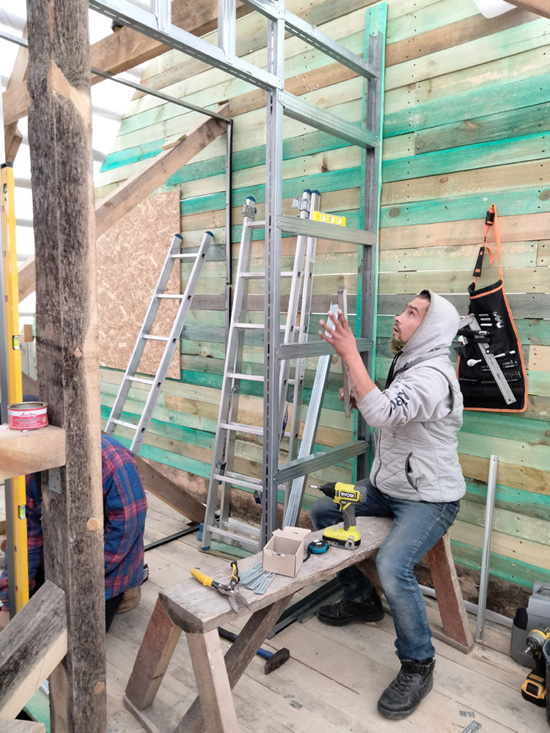
Phoenix crew installing framing at Iryna's house
We got to work; the
team was assembling metal studs for the upstairs bathroom.
Richard and I set off to retrieve loads of bricks from another
project. We made three runs, stopping one time so that we could
explore a bit around the central square of the town. There were
pleasant parks and ancient, historic churches. In one park there were two rows of
about 30 large placards remembering the fallen soldiers: Maksim
Saenko, Viktor Loza, Ivan Oliynik, and many more.
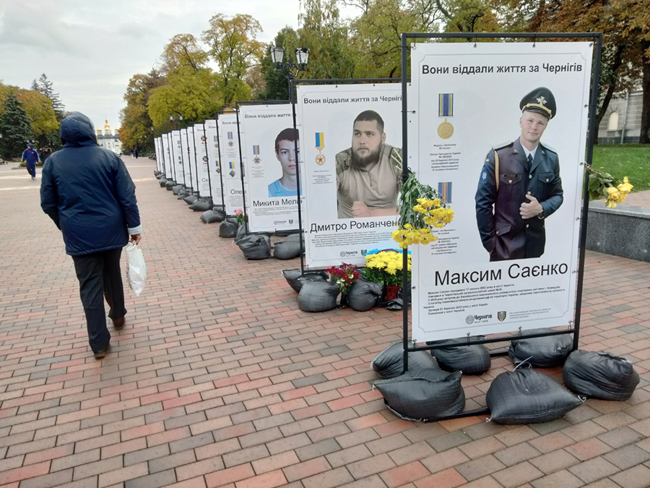
Signs honoring fallen defenders of Chernihiv
There was also a statue, presumably of
the national hero Bohdan Khmelnytsky, who led an uprising
against the Polish rulers in 1648. In 1654 he made a deal in the
town of Pereiaslav with the Muscovite power to join forces; a
Russification trend in Ukraine has been in force most of the
time since then. The statue was inscribed "Pereiaslav 1654."
It's a sure bet that this was a creation of the Russifying power
during the Soviet era, because the contemporary historiography
of independent Ukraine does not look with favor on the
Pereiaslav Agreement of 1654.
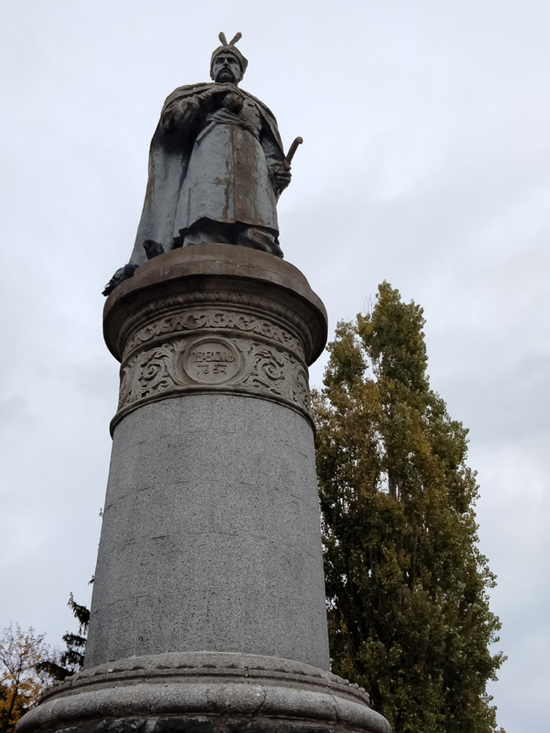
Statue commemorating Pereiaslav
Agreement of 1654
A partly demolished concert hall
dominates one side of the main square. The sides of the
building, the landmark Drama Theater, are in perfect condition,
but there is no roof. It had been bombed just two months before
my arrival by one powerful missile. It was a pleasant Saturday
afternoon, and people were just returning from church. No one
inside the building was killed, but seven people—most of them
driving cars nearby—were killed, including a six-year-old girl.
It was reported that 144 people were injured, including 15
children and the same number of policemen. Windows were blown
out on the other side of the square as well.
Other beautiful, historical old
buildings in the center of town also have big holes in the
roofs. I was told that after the Russians withdrew, people came
out in large groups to help clear the rubble from the main
concert hall. But later, when the economy revived and people got
back to work, there was that much less volunteering.
As we walked around, a few youngsters,
their hair dyed youngster colors, were sitting on a bench
outside the concert hall. As if without a care in the world.
And one night as I was about to go to
bed, an air-raid alarm went off in the city. I went to bed. I
mentioned it this morning, and Valerii just brushed it off.
On my last day at work, the team moved
to a big house that was being rebuilt to accommodate three
families. Some of the menfolk worked with us. The owner's wife
and mother set the lunch table with more food than all ten of us
could eat. There was chicken, trout, potato dumplings with
cabbage, sauerkraut, and a whole lot more. There were even
vegetables. We took at least an hour with that lunch.
One of the owners of the house showed me
the remnant of the bomb that had destroyed it. It was not a big
thing, only about four inches in diameter.
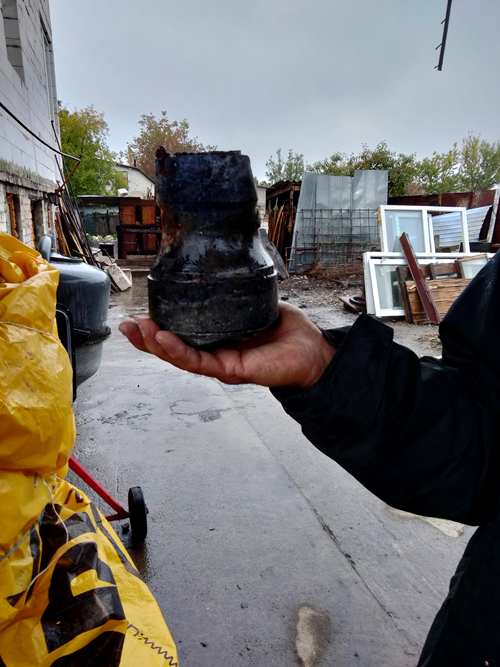
Remnant of a bomb that destroyed
one house
As we were working, a radio played
hip-hop music for much of the day. At one point I asked Ruslan
whether the language was Russian or Ukrainian. He looked at me
and said, "It's English."
On the way home at the end of the day,
we stopped to look at a lovely dark-green van to replace the Gazel. It was good at starting up, but a good bit more expensive
than what Phoenix could afford, and perhaps not as robust as the
old van. We moved on. More than a month later I received the
good news that the Gazel had been replaced, much to everyone's
relief.
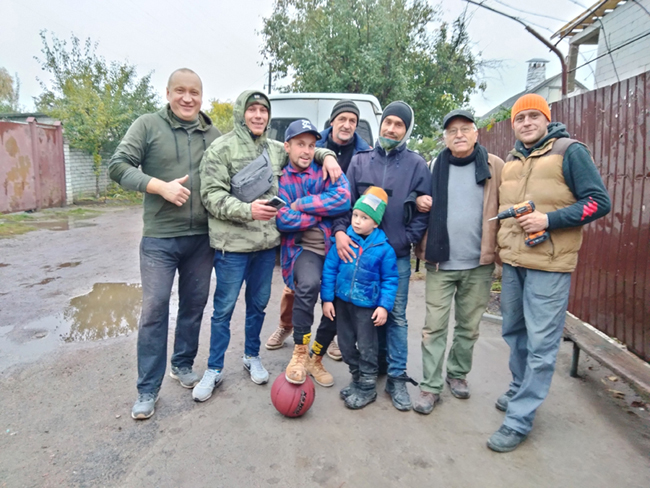
The crew of Phoenix, together with
helpers
But Phoenix needs more financial
support—always. If you wish to donate to a small organization
that I can guarantee as honest and effective, you can bypass
financial complications by donating via PayPal to this account:
phoenix.ua.rebuild@gmail.com.
Their Facebook page is
here.
Pozitivci
Overall, my
impression of volunteer work in the four cities I visited in
Ukraine is that it is a seat-of-the-pants, grassroots activity.
It is heartening that there are so many everyday people from
abroad, and so many more from within the country, who are ready
to work on some level of recovery as the destruction is ongoing.
In Bosnia-Herzegovina and Kosovo I have seen the same thing: in the
midst of war, ordinary people instinctively organized to take care
of each other.
This is resistance at the grassroots
level. The fact that it takes shape before the International
Rescue Committee, Save the Children, Doctors Without Borders,
and so many other international organizations show up is a
natural manifestation of the political and economic response lag
affecting those organizations.
Ordinary folks are trying to rescue
Ukraine, well before the white jeeps swarm into the country. In
Bosnia, they are called pozitivci, the people who try to
do something positive in life. This is an act of hope, a natural
thing. From my experience in Bosnia, I'm aware that,
paradoxically, it is possible to be more hopeful in the middle
of a war than in the aftermath. Today, people are still saying,
"Of course, we will win." How conditions shape up after the end
of Russia's aggression depends on what kind of resolution takes
place. Then, we will know whether to continue to be hopeful or
not.